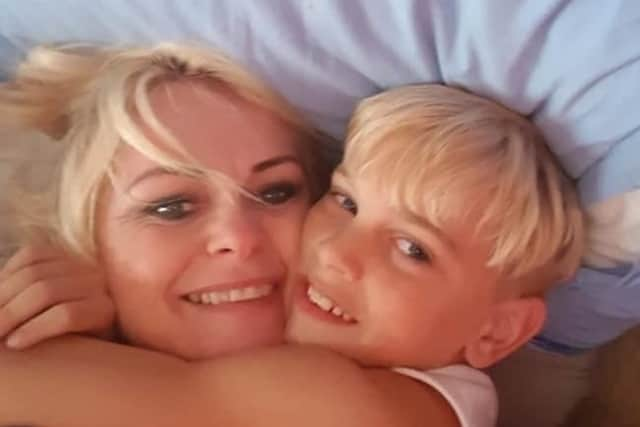Exclusive:TikTok challenges: tech site slammed by grieving mum for failing to take down ‘dangerous’ breathing dares
and live on Freeview channel 276
TikTok has been slammed for failing to take down “dangerous” breathing challenge videos when alerted by a mum whose son died in tragic circumstances.
Lisa Kenevan’s boy Isaac passed away in March 2022, aged 13, after likely taking part in a choke challenge that had become popular on social media. An inquest ruled Isaac, who was “highly inquisitive and intelligent”, died due to misadventure after police found two videos on his phone of him performing the dare.
Advertisement
Hide AdAdvertisement
Hide AdSince then Lisa has become a campaigner for greater internet safety, and has repeatedly reported videos on TikTok of challenges that encourage people to hold their breath for around a minute. Professor Rob Thomas told NationalWorld that a “lack of oxygen, hypoxia, sparks confusion, fainting and even a seizure which could result in permanent brain cell damage”.
The videos, one of which named “killer” has been viewed more than 5.9million times, appear to be aimed at children, as they are designed in the style of the Minecraft game and use voices from Super Mario.
The clips seem to joke about people dying. Half way through a comment appears saying “are you still alive?”, and it encourages viewers to “share this to a friend to challenge them”. Comments on TikTok include “I made it but was about to pass out”, “I made it all the way but almost died of breath” and “I’m not alive sorry”.
The tech site’s guidelines state: “We don’t allow the following: showing or promoting dangerous activities, games, dares, challenges, or stunts that cause or could cause significant physical harm.” However every time Lisa, 51, has reported the videos to TikTok, it’s found that there was no violation. After NationalWorld raised the case with TikTok, it escalated the complaints. At the time of publication, moderators had added age limits onto the videos, but had not completely removed them.
Advertisement
Hide AdAdvertisement
Hide AdA TikTok spokesperson said: “TikTok does not allow dangerous challenges, and we proactively find 99% of content removed for breaking these rules. We partner with independent safeguarding organisations to continuously strengthen our approach, which includes age-restricting certain content and features, and blocking harmful search terms."
TikTok said it does not show videos of known dangerous challenges, such as “choke challenge”, in its search results, and instead directs searches and hashtags to an Online Challenges Safety Center page created with guidance from youth safety experts.


TikTok hold your breath challenge ‘puts people at risk’
Stephen Metcalfe, Lisa’s MP in South Basildon and East Thurrock, Essex, told NationalWorld he expected TikTok to pay “greater attention” to complaints about potentially dangerous challenges. He said: “When it [tech companies’ content] reaches young people I think they have a particular responsibility to ensure what is on their platform is not going to put anyone in danger, or encourage them to put themselves in danger.
“I feel that particularly the example I’ve seen - hold your breath challenge - in my mind is going to put people at risk, and I think TikTok, particularly in this case, should be taking this issue far more seriously than they are. The experience of Lisa just highlights how these things can end in absolute tragedy.
Advertisement
Hide AdAdvertisement
Hide Ad“I’m sure that no-one at TikTok or anywhere else for that matter wants this to happen, and so they are in a position to take action. Certainly when people report issues and highlight their concerns there should be a much greater response.”


YouTube and Instagram dares
These kinds of videos are not limited to TikTok. Similar challenges, which appear to be aimed at children, have got tens of millions of views on YouTube and Instagram - some even joking about when a breathing dare goes wrong.
Lisa said: “When TikTok first came around it was those very soft challenges, bottle flip, ice bucket challenge, the dancing through the Covid times. It was all very soft and innocent and as it’s gone on, TikTok has got more sinister. They’re very, very clever in presenting challenges in a way children will find fun. And some of these are dark, really dark.
“It’s still up and you feel powerless. Someone at the top is scraping off that cream, and they’re not even thinking about the direct effects of parents losing children. It’s disgusting.”
Advertisement
Hide AdAdvertisement
Hide AdHollie Dance’s son Archie Battersbee, 12, died after a strangulation prank or experiment went wrong. Hollie says he watched TikTok for seven minutes before his death - the contents of which remain unknown. Senior Coroner for Essex, Lincoln Brookes, said he could not "rule out the possibility" that Archie had taken part in an online challenge, but police hadn't found any evidence he had.
Hollie told NationalWorld that she thought TikTok “are not policing the platforms properly” with the breathing challenges. “The noise [in the challenge] is so captivating that you can’t help but hold your breath,” Hollie, 48, from Southend, Essex, said. “It says see if you can get to three minutes - I know from Archie, three minutes with no oxygen and you go into cardiac arrest. That’s still on social media.”
Children’s rights online
Leanda Barrington-Leach, executive director at the 5Rights Foundation,which campaigns for children’s rights online, explained that youngsters are wired to “take up challenges and test limits”. She told NationalWorld: “It's concerning to hear that TikTok has ignored repeated calls to ban these types of videos which plainly violate their community guidelines – a clear breach of children’s rights under the Age Appropriate Design Code.
“Children are wired to want to learn, take up challenges and test limits, especially in a social context. TikTok, through its algorithm, is exploiting these vulnerabilities to keep children hooked and make money off them, even if the price to pay is their safety."
Lisa and Hollie are launching a campaign to raise awareness of children's online dangers alongside charity Internet Matters. Carolyn Bunting, co-CEO, said: “We know that dangerous challenges can have a devastating impact on individual children and are a source of significant concern for parents and teachers, who often do not know how to respond.
"We welcome the new Online Safety Act which places a duty on platforms to tackle content that is legal but harmful to children, including content encouraging participation in dangerous challenges. But it continues to be vitally important for parents to stay engaged with their children’s safety online – not least because the new legal protections aren’t yet in force. Helping children understand the potential risks of online challenges and agreeing how they will respond when seeing this kind of content is key.”
Internet Matters has seven key pieces of advice:
- Familiarise yourself with the platforms children use.
- Avoid mentioning the names of specific challenges when speaking to your child to remove the temptation of looking them up.
- Discuss online dangers so they are more aware of what steps to take if they occur.
- Highlight the importance of reporting dangerous challenges.
- If the craze you see seems risky in any way, encourage your child not to share the content further.
- If your child is shown an online challenge, encourage them to use tools within apps to manage their feed.
- Make sure your child’s device is set up with parental controls on your home broadband and child’s device.
Advertisement
Hide AdAdvertisement
Hide AdProf Thomas, NationalWorld’s expert doctor, explained why breathing challenges are so dangerous. He said that limiting oxygen to our body and brain upsets our PH balance.
Prof Thomas added: “In the heart, this can trigger deviant electrical activity causing abnormal beats and a drop in blood pressure, further contributing to the lack of oxygen in the body. A more serious change in heart rhythm can continue even when breathing starts again, which could lead to a heart attack and even death.”
Ralph Blackburn is NationalWorld’s politics editor based in Westminster, where he gets special access to Parliament, MPs and government briefings. If you liked this article you can follow Ralph on X (Twitter) here and sign up to his free weekly newsletter Politics Uncovered, which brings you the latest analysis and gossip from Westminster every Sunday morning.
Comment Guidelines
National World encourages reader discussion on our stories. User feedback, insights and back-and-forth exchanges add a rich layer of context to reporting. Please review our Community Guidelines before commenting.
